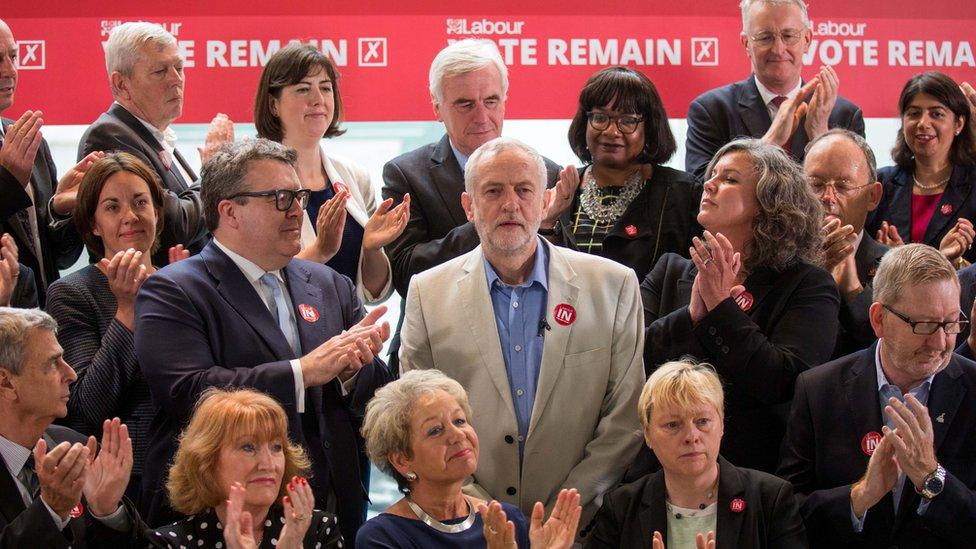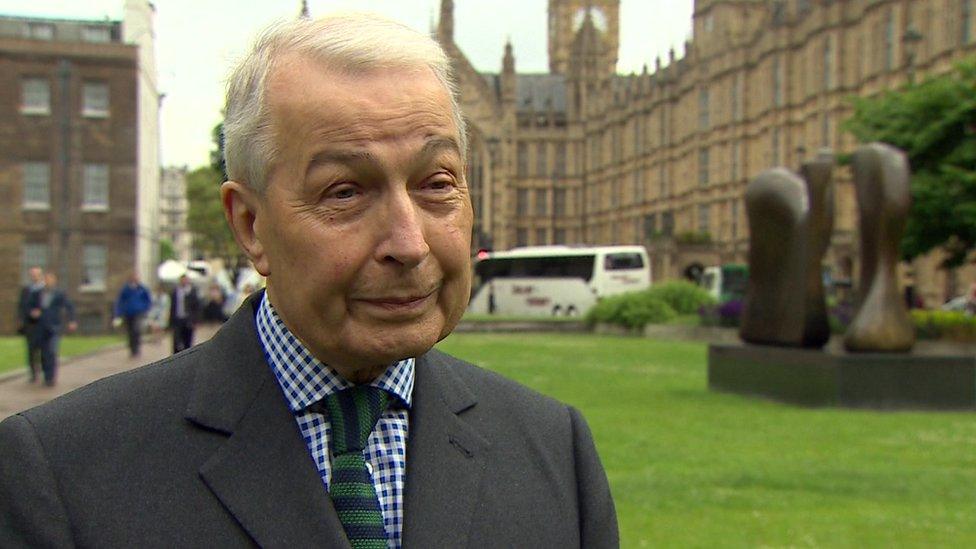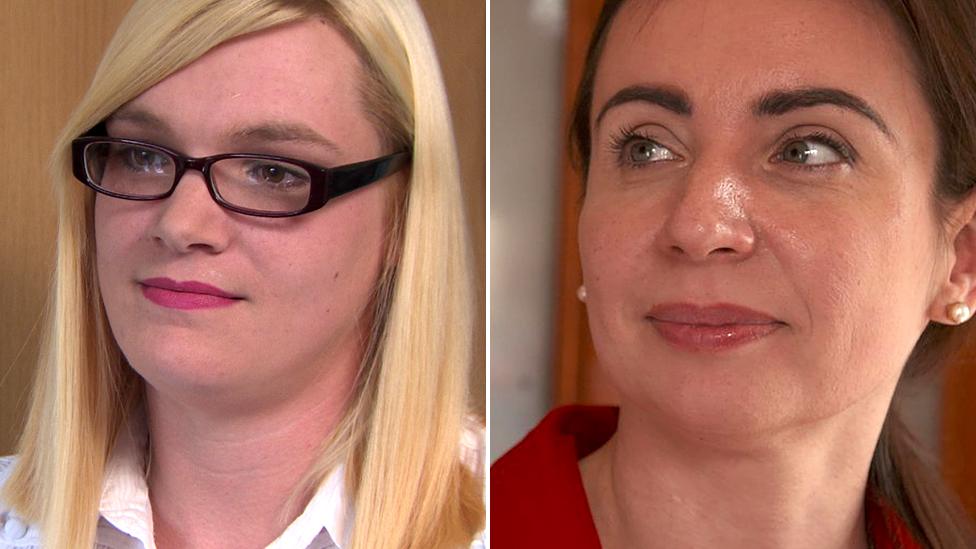Labour's Tom Watson: EU free movement rules must change
- Published
Tom Watson speaks to Laura Kuenssberg
Deputy Labour leader Tom Watson has said EU immigration rules may have to be revisited, saying "woe betide" the party if it ignores public concerns.
A future government, he said, would have to make the case to revise EU-wide freedom of movement rules for workers.
Labour MP John Mann, a Leave supporter, said the party was finally "admitting defeat" over backing for open borders.
It came as Jeremy Corbyn praised the role of migrants in the NHS and urged Labour to unite to stay in the EU.
Vote Leave said there was confusion within Labour over its stance on immigration, ten days ahead of the referendum on whether the UK should stay in or leave the EU.
In a speech at the TUC's headquarters in London Mr Corbyn publicly thanked the "fantastic service" provided by foreign-born doctors, nurses and other professionals in the NHS.
"We welcome them, we work with them and we're proud of what they do," he said.
He challenged leading Conservative Leave supporters who have said leaving the EU would free up £100m a week extra to spend on the NHS, to acknowledge the impact that it would have on the public services.
"What's the answer Johnson, Farage and Gove have got to that? The NHS couldn't afford to lose 52,000 dedicated professionals and still deliver the service we need. They should think about these things before they shoot their mouths off in the way that they do."
'Pushed around'
But Mr Corbyn is facing growing calls from within his party to take a tougher line on immigration amid concerns that Labour voters who feel strongly about the issue are leaning towards voting Leave on 23 June.
Most of Labour's 229 MPs support staying in the EU. Former minister Frank Field, one of about 10 who back leaving, said Labour voters felt left behind by globalisation and alarmed by levels of immigration and would no longer be "pushed around" by an out-of-touch elite at the top of the party.
He warned that if Brexit-supporting Labour voters were made to feel "unclean" about their choice, there would be mass defections to UKIP and Labour's chances of winning the next election would be doomed.
"The idea that Labour voters are owned by the party... and the troops will do as they are told. That may have happened in 1945 but it has long ceased to happen and it isn't going to happen this time."

Analysis by BBC political editor Laura Kuenssberg

Tom Watson, centre-left, is among shadow cabinet members applauding Jeremy Corbyn
Few people would pick a political fight with Tom Watson. Like Jeremy Corbyn, he has his own mandate from Labour Party members, who chose him to be the deputy, alongside the new leader.
So when he speaks, Labour listens.
That's why it was striking today that he chose to suggest that Labour needed not just to listen harder to their natural supporters on immigration, but to suggest that a future Labour government should pursue reforms to the rules that allow EU citizens from other countries to come and live in this country.
He knows that for many of the party's traditional supporters, the changes, or perhaps perceived changes, to their communities that the arrival of many particularly Eastern Europeans have brought have created worries and concerns - so much so that he said "immigration has been the backdrop to every election we have had in Britain" for the last decade.
That's quite some statement.

Mr Watson said that while he supported the UK staying in Europe, the issue of uncontrolled migration was "coming up on the doorstep" and people need to be reassured that a Remain vote did not mean the end to reforms in Europe.
"For the last decade, I would say that immigration has been the backdrop to every election we've had in Britain," he said. "And you know, woe betide politicians that don't listen to what voters tell them.
"You know, I think a future Europe will have to look at things like the free movement of labour rules."
Greater controls on economic migration should be a priority for a future Labour government, he suggested.
Shadow home secretary Andy Burnham has said rules should be brought in immediately to protect skilled wages and discourage the use of agency staff from across Europe.
"It would work by setting clear rules that the going rates for work in the skilled sector cannot be undermined because what we get at the moment is people brought in at the minimum wage that undercut electricians or plasterers or whatever it might be," he said.
Vote Leave has been campaigning hard on immigration, saying the UK is powerless to control the numbers while it remains in the EU.
Conservative Energy Minister Andrea Leadsom told the Guardian, external her constituents complained to her that they did not hear English spoken when they walk down the high street.
"We absolutely fabulously integrate as a society but not if you overwhelm us," she said.
Earlier on Tuesday, flanked by his shadow cabinet, Mr Corbyn warned that the future of the NHS could be threatened by a Leave vote while, in a co-ordinated attempt to bring Labour voters on side, union leaders also warned of public sector cuts.
Speaking the day after ex-leader Gordon Brown attempted to galvanise the party's supporters, Mr Corbyn said there would be a "bonfire" of workers' rights if there was a UK vote to leave the EU.

Frank Field said Labour voters would not be pushed around
"We want to defend the very many gains made by trade unions across Europe that have brought us better working conditions - longer holidays, less discrimination and maternity and paternity leave," he said at the TUC's headquarters.
"We believe a leave vote will put many of those things seriously and immediately at risk.
"We also want to extend those rights and we best extend those rights by working with trade unions, labour parties and socialist parties all across Europe in the interest of the working people all across the continent."
Meanwhile, leaders of some of the country's biggest trade unions, including the TUC's Frances O'Grady and Len McCluskey of Unite, have signed a letter, external saying they are worried leaving the EU will be "a disaster for working people".
Another letter, signed by 60 past heads of the UK's medical royal colleges and the British Medical Association, say the UK benefits from EU-wide action on infectious diseases and access to new medicines.

Analysis by political correspondent Iain Watson
The message from Jeremy Corbyn today was that Brexit would be bad for your health - arguing that many in the Leave campaign are no friends of the NHS.
But some in his shadow cabinet believe Labour has to talk more about the issue that's concerning many of their traditional voters: immigration. And those voters have to hear practical proposals.
Shadow home secretary Andy Burnham is calling for action to protect the living standards of skilled workers and prevent them from being undercut by migrants.
Another shadow cabinet member said he was picking up that some of the party's supporters were 'weak Leave' and could be brought round to Remain by a clearer and more consistent campaign on issues that concerned them.
Others said that voters simply needed reminding that the vast majority of Labour MPs back Remain.
Mr Burnham told me there is still time to win over the sceptics but his view isn't shared by all senior Labour politicians. As one senior figure close to the unions put it: 'People want change. If Brexit is the only change on offer, they'll take it."

The Remain campaign also received a boost when the chairman of retailer John Lewis said leaving the EU would have an "adverse impact" on consumer confidence.
Sir Charlie Mayfield told BBC Radio 4's The World at One the impact could be felt for as much as five years and he said it would probably lead to higher prices in the shops and could have an impact on jobs.
"As a businessman and looking at the economic issues, I do think that the economy will remain stronger if we remain in the European Union and that does matter," he said.
Leave campaigners say the economy would thrive outside the EU, with the UK able to form new trade deals with countries outside Europe.
- Published14 June 2016

- Published13 June 2016
- Published14 June 2016
- Published14 June 2016
